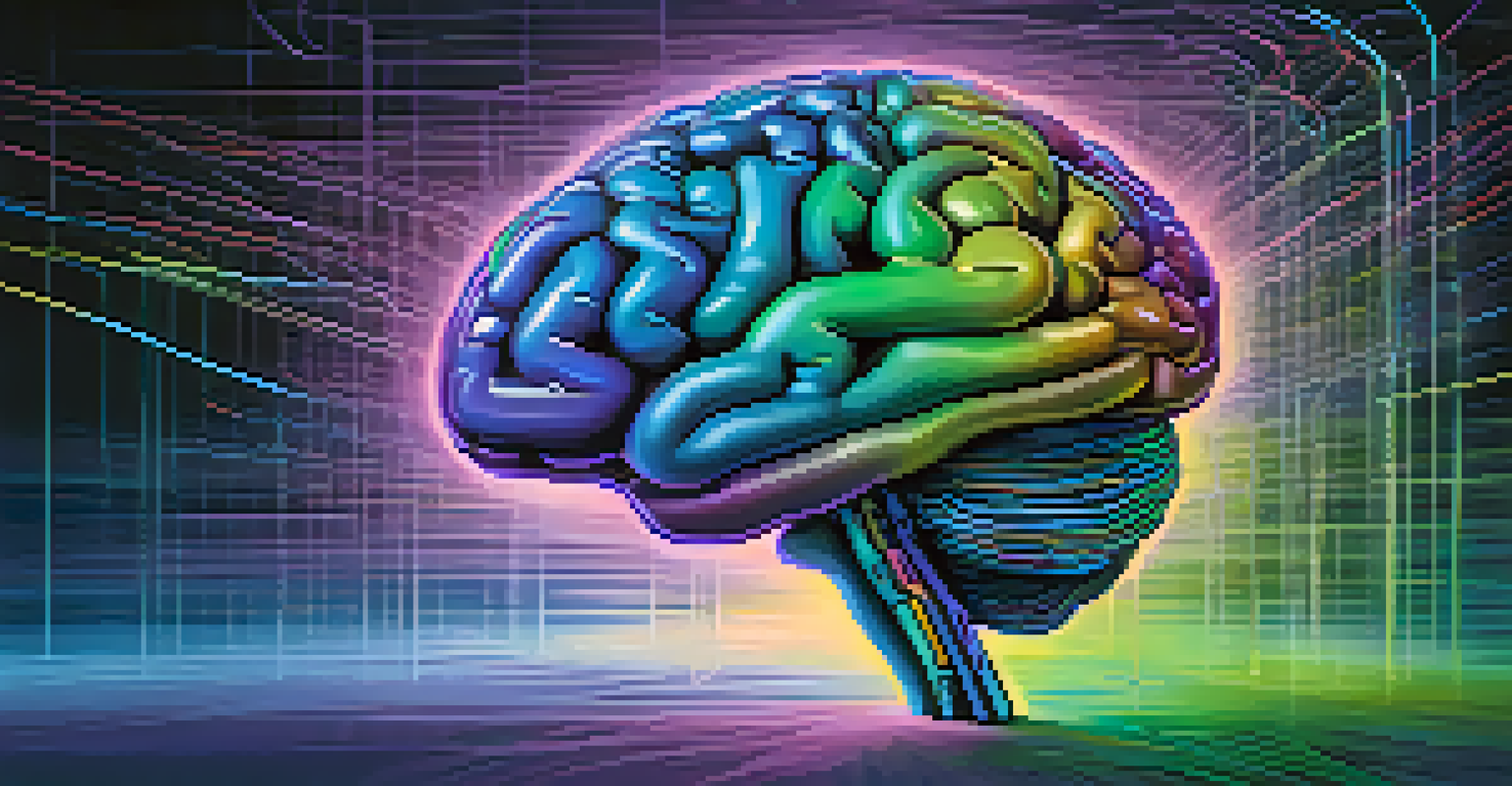DMN Disruption: How Entheogens Alter Consciousness

Understanding the Default Mode Network (DMN)
The Default Mode Network (DMN) is a network of brain regions that's active when we're not focused on the outside world. Think of it as the brain's autopilot, where daydreaming, self-reflection, and memory recall occur. This network plays a crucial role in shaping our sense of self and our internal narratives.
The mind is everything. What you think you become.
When we engage in introspective activities, such as meditation or daydreaming, the DMN lights up. It contrasts sharply with the brain's other networks that are active during focused tasks. Understanding the DMN is essential when discussing how entheogens can alter consciousness.
In essence, the DMN helps us navigate our inner landscape, but its activation can also lead to overthinking or rumination. This balance becomes particularly interesting when we consider the effects of substances like entheogens, which can significantly disrupt this network.
What Are Entheogens?
Entheogens are substances, often derived from plants, that are used in spiritual or religious contexts to facilitate altered states of consciousness. Common examples include psilocybin mushrooms, ayahuasca, and peyote. These substances have been used for centuries in various cultures for healing, ritualistic practices, and personal exploration.

The term 'entheogen' combines the Greek words for 'god' and 'to generate,' highlighting their role in inducing profound spiritual experiences. Unlike recreational drugs, entheogens are often taken with intention and purpose, aiming to connect users with deeper aspects of themselves or the universe.
DMN and Inner Reflection
The Default Mode Network (DMN) is crucial for self-reflection and creativity, but its activation can also lead to overthinking.
As the interest in these substances grows in modern society, so does the research around their potential therapeutic benefits. Understanding how they interact with the DMN is key to unlocking their transformative power.
How Entheogens Disrupt the DMN
When entheogens are consumed, they can lead to a temporary disruption of the DMN, often resulting in a feeling of ego dissolution. This experience can be likened to the sensation of stepping outside oneself, where the boundaries of identity blur. Such profound shifts in perspective are often described as liberating and enlightening.
We are not human beings having a spiritual experience; we are spiritual beings having a human experience.
Research indicates that substances like psilocybin can decrease the connectivity within the DMN. This reduction in connectivity may help alleviate symptoms of anxiety and depression by allowing individuals to break free from their habitual thought patterns. It's like turning down the volume on a noisy radio, making space for new insights.
This disruption can also promote connectivity between other brain networks, leading to enhanced creativity and problem-solving abilities. Imagine your brain as a city where traffic jams are common; entheogens can help clear the roads, allowing fresh ideas to flow more freely.
Experiential Insights: User Perspectives
Many individuals who have used entheogens report transformative experiences that fundamentally change their understanding of consciousness and existence. Users often describe feelings of interconnectedness with others and the universe, which can be deeply profound. These experiences can lead to lasting changes in perspective, values, and emotional well-being.
For instance, someone might enter a session with anxiety about their life choices and emerge with a renewed sense of purpose and clarity. This shift can be compared to cleaning a dusty window; once the grime is wiped away, the view becomes clearer and more vibrant. Such stories highlight the potential of entheogens to facilitate personal growth.
Entheogens and Consciousness
Entheogens disrupt the DMN, leading to ego dissolution and new perspectives, which can alleviate anxiety and enhance creativity.
However, it's important to note that not every experience is positive. Some users report challenging journeys, often referred to as 'bad trips.' These experiences can be difficult but may also offer valuable lessons and insights, reinforcing the idea that the journey through consciousness is complex and multifaceted.
Neuroscience Behind Entheogens and Consciousness
Neuroscientific research into entheogens has revealed fascinating insights into how these substances rewire brain activity. Studies using brain imaging techniques have shown that entheogens can alter neural pathways, leading to changes in perception and cognition. This process can be likened to reprogramming a computer; the same hardware can produce entirely different outputs based on how it's configured.
The interaction between entheogens and serotonin receptors in the brain is a key factor in this transformation. Serotonin is a neurotransmitter that plays a crucial role in mood regulation and perception. By binding to these receptors, entheogens can induce profound changes in mood and awareness, often resulting in altered emotional states.
Moreover, researchers are exploring how these changes can contribute to therapeutic outcomes, particularly for conditions like PTSD and depression. Understanding the neuroscience behind these experiences not only demystifies the process but also highlights their potential as tools for healing and self-discovery.
Cultural Significance of Entheogens
Throughout history, entheogens have played a vital role in various cultures around the globe, often intertwined with spiritual and healing practices. Indigenous communities have long recognized the power of these substances for connecting with the spiritual realm and understanding the mysteries of life. For them, entheogens are not merely substances; they are sacred tools for navigating consciousness.
In modern times, there has been a resurgence of interest in these practices, with many seeking to reclaim ancient wisdom. This revival is often accompanied by a broader movement towards holistic healing, emphasizing the importance of mind-body-spirit connections. It's akin to rediscovering an old family recipe that nurtures both body and soul.
Cultural and Therapeutic Value
Entheogens have significant cultural significance and growing recognition for their potential therapeutic benefits in mental health.
Understanding the cultural context of entheogens is crucial, especially as their use becomes more mainstream. Respecting the traditions and knowledge of indigenous peoples is essential in ensuring that these practices are honored and not appropriated.
Future Perspectives on Entheogens and Consciousness
As research into entheogens continues to evolve, we stand at the brink of a new understanding of consciousness and mental health. Many scientists and therapists are optimistic about the potential for entheogens to revolutionize treatment for various mental health issues. This shift could change how we approach healing, emphasizing holistic and integrative methods.
Moreover, as society becomes more open to discussing altered states of consciousness, we may see a cultural transformation in how we view mental health and well-being. Public perceptions are changing, and conversations about mental wellness are becoming more inclusive of alternative therapies. It's like the dawn of a new day, where different approaches to healing are welcomed and explored.

However, with this potential comes responsibility. As we navigate this new terrain, it is essential to advocate for safe, informed, and respectful practices regarding entheogen use. By fostering a culture of awareness and understanding, we can harness the benefits of these substances while minimizing risks, paving the way for a more conscious society.